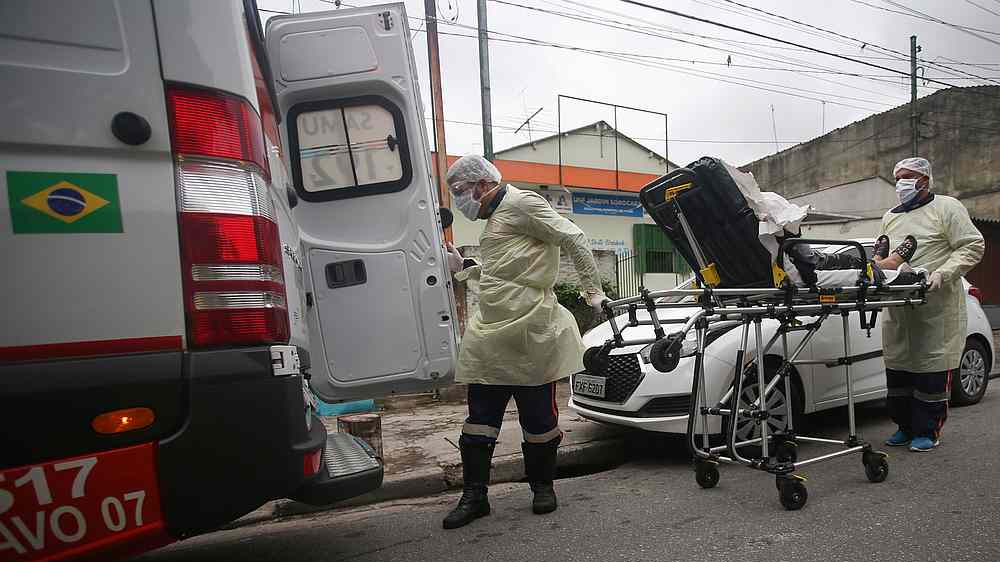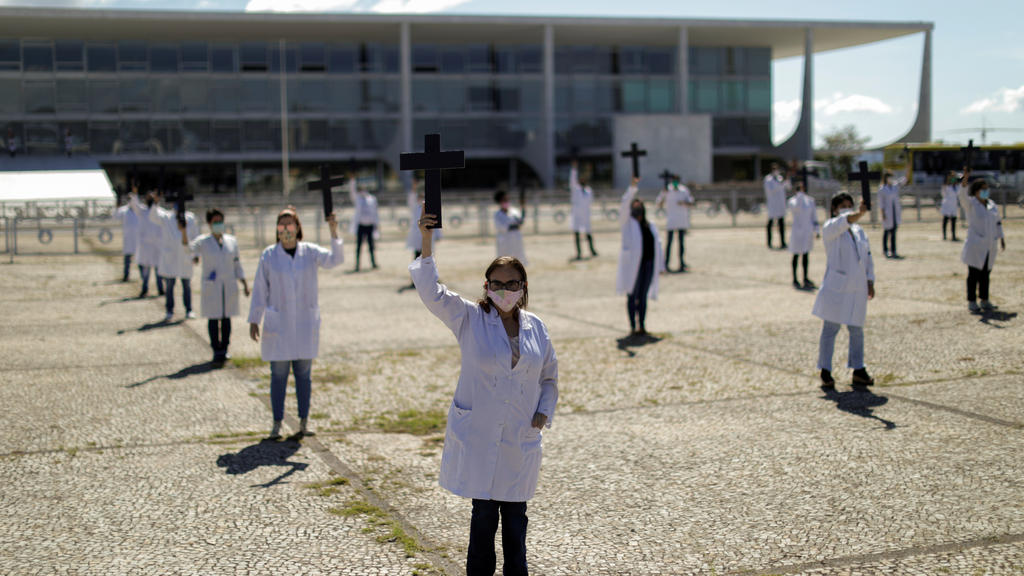
Nurses of Emergency Rescue Service transport a patient from a basic heath unit to a hospital during the COVID-19 outbreak in Santo Andre, Sao Paulo State, Brazil, May 7, 2020. /Reuters
Nurses of Emergency Rescue Service transport a patient from a basic heath unit to a hospital during the COVID-19 outbreak in Santo Andre, Sao Paulo State, Brazil, May 7, 2020. /Reuters
Brazil is fast becoming the new coronavirus hotspot, with the total number of deaths reaching 15,000 and confirmed cases surpassing 200,000, making itself the world's sixth worst-hit country. Among these deaths, Brazil's Federal Council of Nurses (COFEN) reported on Saturday 116 deaths among nurses, nursing assistants and technicians, which means Brazil leads this tragic tally in the world, ahead of the U.S. (103), UK (35) and Italy (more than 30).
According to the Brazilian Nursing Observatory, the South American country has 14,861 coronavirus cases among these professionals, with a fatality rate of 2.14 percent. Around 61 percent of those 109 deaths were women. Sao Paulo and Rio de Janeiro are the states with the highest number of fatalities. These numbers even fueled recent protests as the country continues on the road of a political crisis, with the health minister resigning less than one month after taking office.
"Several factors are interfering in the way the disease has advanced in the country," Viviane Camargo, a nurse in Sao Paulo, told CGTN Digital. At the top of her list stand questions related to personal protective equipment (PPE), like many other countries facing the pandemic.
"We have been getting complaints and data from onsite inspections detailing the complete or partial lack of PPE for professionals on the front line," Camargo said, adding that the PPE sometimes doesn't meet the recommended technical specifications.
Other times, a third problem appears: some nurses don't know how to use the PPE correctly. "We needed a higher level of training."
Improper PPE removal can lead to tragic consequences
"We know several professionals get contaminated when they remove the PPE. This equipment has a specific method to be put on and then removed. Nurses are in close contact with patients and clothes might be contaminated, if they don't remove it correctly, they can get contaminated at that moment," Camargo noted.
These statements are supported by Walkirio Almeida, a member of COFEN's crisis committee. "We have detected some supply problems. Some hospitals don't have the recommended equipment, and to try and minimize the risks, they created improvised versions, for example, plastic rain covers instead of impermeable aprons. Other hospitals are rationing, so nurses and nursing technicians use the same equipment for several days in different shifts, contradicting the norms and even the manufacturers' orientations," he explained to CGTN Digital.
"We also detected a lack of knowledge when it comes to protocols to remove PPE at the end of the shift. We think this might be resulting in the infection of these professionals," Almeida added, noting that the Observatory's numbers demonstrate exactly that.
Video: COVID-19: Brazil converted Maracana Stadium into field hospital
Video: The Global Guardians: Saving the favelas of Rio de Janeiro
This problem related to training is also applicable to protocols on how to deal with suspected and confirmed COVID-19 patients. "These factors are extremely important when we consider that they are the ones spending more time next to the patients," he said.
Camargo also pointed to another contributing factor: the high number of professionals in high-risk groups, either because they are 60 or older, or/and have chronic diseases or illnesses that affect their immune system.
"We have been working with other public organs like the public prosecution office, labor ministry to try and minimize these questions," she said, emphasizing that institutions across all fields must work together.
"We can't admit that these professionals, who are taking care of the lives of others, are put at risk because of institutional issues," the nurse remarked.

Nurses wearing protective face masks hold crosses during a symbolic protest and tribute for health workers on International Labor Day, in Brasilia, Brazil, May 1, 2020. /Reuters
Nurses wearing protective face masks hold crosses during a symbolic protest and tribute for health workers on International Labor Day, in Brasilia, Brazil, May 1, 2020. /Reuters
Underpaid and overworked, nurses were 'shelved' by politics
Alongside this situation, nurses have long work journeys in two or three different locations. "Unfortunately, in Brazil the class is not well paid, so they need to have several work contracts, spending a considerable amount of time exposed to the virus," Camargo clarified.
"The overload of work is a reality with a long past, and these days it has intensified," noted Almeida, identifying undersized nursing teams as an additional layer to this problem.
The number of nurses working in the hospitals is not sufficient compared to the actual demand, and, contrary to expectations, even the pandemic didn't bring a change. This "imbalance" prevails with some hospitals pushing back in the necessary adjustments.
As COFEN's head of the department in charge of managing the profession, Almeida notes that "nurses have been facing many and great challenges to regulate laws that can guarantee fairer work shifts and better remunerations."
These laws face significant resistance in the Chamber of Deputies (federal legislative body and the lower house of the National Congress of Brazil). For example, a law draft limiting weekly shift hours has been approved in specific commissions but is still waiting for the deputy's approval stamp in a process that is going for 20 years. Another one, to guarantee decent wages has been on the shelf for five years.
Read more:
Brazil loses new health minister as Bolsonaro grabs reins in coronavirus crisis
In Brazil, nurses represent 60 percent of the medical workforce, so "there is no chance to implement health policies in the country without their effective participation," Almeida noted.
"Brazil has taken really bad care of its nurses, but we hope that the visibility the profession is getting might change that, especially with the approval of laws that improve the living conditions of these professionals by the political class," he said.
According to Almeida, "the problems that they have been facing are not new, just more obvious because of the pandemic."
Emotional stress and discrimination
Adding to the work challenges, nurses also face emotional distress. "We go through very specific questions related to stress, work overload, multiple work contracts, but also because this is a very fast disease, we see many people dying completely on their own, isolated, alone and this brings us a lot of pain," Camargo said.
The situation required the intervention of the Federal Council, which mobilized a team of 120 specialized nurses in mental health to support nurses. COFEN's team has taken more than 3,000 calls from nursing professionals looking for help – an average of 130 requests per day.
Besides these hurdles, nurses are now also falling victim to abuse. "We go from being celebrated in the balconies on day, to being mistreated in the streets, in the public transports. We know cases of nurses that found tickets in their cars saying 'why don't you move away.'"
"These situations have a great emotional impact on us. We are doing our best, acting the best way we can, worrying about not getting contaminated, because we don't have the right or enough equipment, worrying about going home and taking the disease with us, and being mistreated on the way," Camargo concluded.